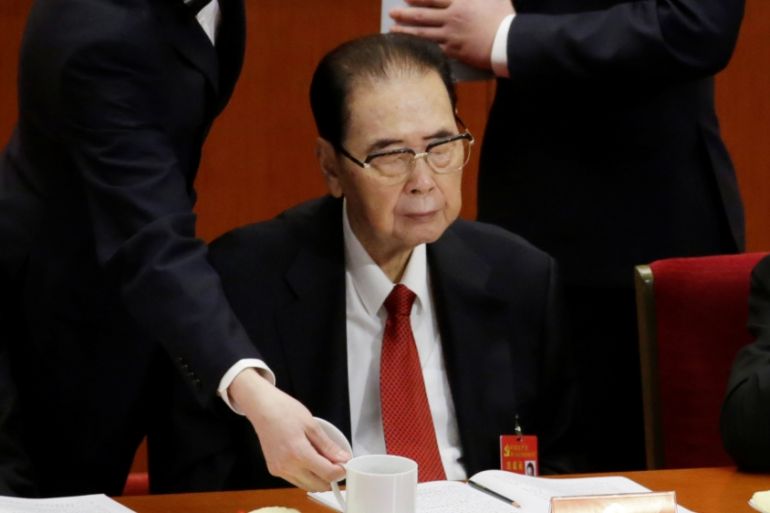Li Peng, Chinese premier during Tiananmen crackdown, dies at 91
Li Peng was best known as one of the key architects of the bloody breakup of pro-democracy protests in Beijing in 1989.

Former Chinese Premier Li Peng, known as the “Butcher of Beijing” for his role in the Tiananmen Square crackdown, has died aged 91, according to state media.
The official Xinhua news agency said Li died of an unspecified illness in Beijing on Monday.
The ex-premier had previously battled bladder cancer.
Li gained notoriety worldwide as one of the key architects of the brutal breakup of mass pro-democracy demonstrations in the capital on June 4, 1989. He proclaimed martial law on May 20, 1989, after vast crowds of students, workers and others encamped for weeks in Tiananmen Square to demand change.
Two weeks later, on the night of June 3-4, the military put a bloody end to the protests, killing hundreds of unarmed civilians – by some estimates more than 1,000.
Although the decision to send in the troops was a collective one, Li has been widely held responsible for the crackdown.
Li frequently defended the decision to fire on the demonstrators as a “necessary” step.
“Without these measures, China would have faced a situation worse than in the former Soviet Union or Eastern Europe,” he said on a tour of Austria in 1994 as his international pariah status started to wear off.
Li oversaw China’s re-emergence from post-Tiananmen isolation into rising global diplomatic and economic clout, a development he celebrated in nationalistic public statements.
“Ridding themselves from the predicament of imperialist bullying, humiliation and oppression, the calamity-trodden Chinese people have since stood up,” Li said in 1995 in a speech for the October 1 anniversary of the 1949 revolution.
During his final years in power, he pushed through approval for his pet project, the gargantuan $22bn Three Gorges Dam on the Yangtze River, which forced 1.3 million people to leave homes that were swallowed up by its enormous reservoir.
Li stepped down as premier in 1998, becoming chairman of the National People’s Congress, China’s parliament.
He retired from the party’s seven-member ruling Standing Committee in 2002 as part of a long-planned handover of power to a younger generation of leaders headed by Hu Jintao.
In his later years, Li rarely appeared in public, and was mostly only seen at official gatherings aimed at displaying unity such as in 2007 at the 80th anniversary of the founding of the People’s Liberation Army.
On Tuesday, Xinhua said that “under the strong support” of then-leader Deng Xiaoping, “Comrade Li Peng took a clear stand and together with most of the comrades of the Political Bureau of the Central Committee, took decisive measures to stop the unrest and pacify the counterrevolutionary riots”.
He “stabilised the domestic situation, and played an important role in this major struggle concerning the future of the party and the country”, Xinhua added.